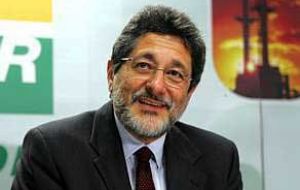MercoPress. South Atlantic News Agency
Production of giant Tupi oilfield by 2010, forecasts Brazil
 CEO Gabrielli estimates that U$D 2 to 3 billion are needed to develop Tupi field
CEO Gabrielli estimates that U$D 2 to 3 billion are needed to develop Tupi field Brazil's government oil corporation Petrobras has plans to invest 2 to 3 billion US dollars to begin prospecting in the giant deposit of Tupi which has recoverable reserves in the range of 5 to 8 billon barrels of crude and natural gas.
According to Petrobras CEO Jose Sergio Gabrielli the initial investment will be destined to the purchase of a deep water prospecting rig, floating systems and other equipment necessary to advance the exploration pilot project. In an interview with O Estado de Sao Paulo, Gabrielli said the corporation's target is to have the Tupi pilot project working by 2010, with an initial production in the range of 100.000 barrels per day. "We still don't have the definitive estimates, but they shouldn't be too different from our current costs. Maybe a little bit higher which means we will have investments in the range of 2 to 3 billion US dollars for the pilot project", he said. Petrobras exploration and production director, Guilherme Estrella said that Petrobras hopes to declare Tupi's commercial viability in 2008 or 2009, but it already has teams of experts working on the field development scheme. "Before the end of the year, they have to come up with concrete concept proposals on how to use the gas that comes jointly with oil, because this will define how we are going to develop the area," Estrella said. Petrobras has also said it saw good prospects for major oil finds in the sub-salt areas in the Campos and Espirito Santo basins north of Santos, but Estrella said Santos remained the immediate priority. Petrobras partners in Tupi or other Santos sub-salt blocks include Britain's BG Group, Spain's Respol and Galp of Portugal. Tupi lies far from the coast, which is densely populated and has environmentally-sensitive areas, which would make it extremely difficult to build a gas pipeline to the shore. "We have an enormous opportunity of having a new approach to production systems different from traditional models," Estrella said. "Normally, you'd mount an FPSO (floating production, storage and offloading) rig on a field, lay a pipeline to the coast, then install several more rigs and end up with a big production complex. This one we could treat as a giant production complex from the very start with shared structures, replicated projects, system management," he said. Petrobras is considering to have floating power plants anchored around the field that would use associated natural gas, sending their electricity to mainland via sub-sea cables and straight to oil production rigs. "This simplifies rig projects enormously as they won't need generating modules," he said. Excess natural gas can be immediately liquefied at ship-based liquefier units and then sent to re-gasification terminals on the coast, which Petrobras is already building, or processed into diesel using the so-called gas-to-liquids technology. "Then far at sea you can have an intertwined, independent energy system. Nobody has tried it yet, but we don't see technological obstacles there" Estrella said. In related news Petrobras announced that on November 23 production tests began at Platform P-52 in Roncador oil field in the Campos basin 125 kilometers off shore. P-52 is a semi-submersible production unit with a capacity to process 180.000 b/d of oil, to compress 9.3 million cu m/day of gas, and to inject about 300.000 b/d of water into the reservoir. It is installed in 1.800 meters of water, a Brazil record. The platform initially will handle volumes of about 20.000 b/d but is expected to reach its total capacity of 180.000 b/d in mid-2008 when it will be interconnected to 18 production and 11 water injector wells. The platform's hull was built in Singapore, and its operating modules were manufactured in Brazil




Top Comments
Disclaimer & comment rulesCommenting for this story is now closed.
If you have a Facebook account, become a fan and comment on our Facebook Page!